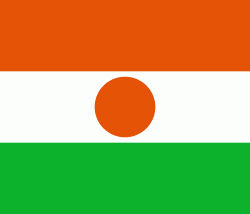Kanuri language
Kanuri is a dialect continuum spoken in Nigeria, Niger, Chad and Cameroon, as well as in small minorities in southern Libya and by a diaspora in Sudan.
At the turn of the 21st century, its two main dialects, Manga Kanuri and Yerwa Kanuri (also called Beriberi, which its speakers consider to be pejorative), were spoken by 9,700,000 people in Central Africa. It belongs to the Western Saharan subphylum of Nilo-Saharan. Kanuri is the language associated with the Kanem and Bornu empires that dominated the Lake Chad region for a thousand years.
The basic word order of Kanuri sentences is subject–object–verb. It is typologically unusual in simultaneously having postpositions and post-nominal modifiers – for example, "Bintu's pot" would be expressed as nje Bintu-be, "pot Bintu-of".
Kanuri has three tones: high, low, and falling. It has an extensive system of consonantal lenition; for example, sa- "they" + -buma "have eaten" → za-wuna "they have eaten".
Traditionally a local lingua franca, its usage has declined in recent decades. Most first-language speakers speak Hausa or Arabic as a second language.
At the turn of the 21st century, its two main dialects, Manga Kanuri and Yerwa Kanuri (also called Beriberi, which its speakers consider to be pejorative), were spoken by 9,700,000 people in Central Africa. It belongs to the Western Saharan subphylum of Nilo-Saharan. Kanuri is the language associated with the Kanem and Bornu empires that dominated the Lake Chad region for a thousand years.
The basic word order of Kanuri sentences is subject–object–verb. It is typologically unusual in simultaneously having postpositions and post-nominal modifiers – for example, "Bintu's pot" would be expressed as nje Bintu-be, "pot Bintu-of".
Kanuri has three tones: high, low, and falling. It has an extensive system of consonantal lenition; for example, sa- "they" + -buma "have eaten" → za-wuna "they have eaten".
Traditionally a local lingua franca, its usage has declined in recent decades. Most first-language speakers speak Hausa or Arabic as a second language.
Country
-
Niger
Niger or the Niger, officially the Republic of the Niger (République du Niger, Jamhuriyar Nijar), is a landlocked country in West Africa. It is a unitary state bordered by Libya to the northeast, Chad to the east, Nigeria to the south, Benin and Burkina Faso to the southwest, Mali to the west, and Algeria to the northwest. It covers a land area of almost 1,270,000 km2, making it the largest landlocked country in West Africa. Over 80% of its land area lies in the Sahara. Its predominantly Muslim population of about million live mostly in clusters in the further south and west of the country. The capital Niamey is located in Niger's southwest corner.
It is one of the least developed countries and is also one of the poorest countries in the world by GDP per capita. Some non-desert portions of the country underwent periodic drought and desertification. The economy is concentrated around subsistence agriculture, with some export agriculture in the less arid south, and export of raw materials, including uranium ore. It faces challenges to development due to its landlocked position, desert terrain, low literacy rate, jihadist insurgencies and the world's highest fertility rates due to birth control not being used and the resulting rapid population growth.
